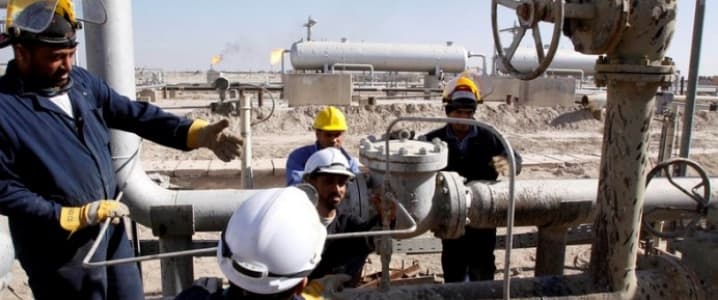Saudi Arabia will deal ministers a 20 percent pay cut and scale back perks for government employees—two-thirds of employed Saudis—as it grapples with the realities that accompany an $87 billion budget deficit for 2016. A much more acute budget deficit than its rival Iran, as the chart below shows:
(Click to enlarge)
The state-run Ekhbariya TV announced the royal decree, along with a cabinet statement, on Monday, just as Saudi Arabia began its participation in the International Energy Forum in Algiers.
Saudi Arabia – de facto leader of OPEC – is currently discussing the possibility of a long-desired oil production freeze.
Speculation on whether the 14-member bloc will agree on an output deal has run rampant in recent weeks, taking oil prices on a roller coaster ride. For the third time this year, Saudi Arabia does not seem motivated to curb production as Iran’s oil sector recovers, even as its less financially savvy OPEC comrades crumble politically and economically under the weight of two years of abysmal oil revenues.
As the present economics of oil—which require a $66.70 barrel price to make Saudi crude profitable—continue to work against the world’s energy producers, the KSA has turned its focus towards its long-term “Vision 2030” strategy of economic diversification.
Schlumberger, General Electric and Siemens have all contributed plans for the realization of Saudi Arabia’s revitalization program, according to Abdulaziz al-Abdulkarim, Saudi Aramco’s vice-president for procurement and supply chain management.
The state-run energy giant’s oil infrastructure will receive a $334 billion facelift by 2025, which will enhance the kingdom’s ability to extract shale gas, the executive said at the Middle East Petrotech Conference in Bahrain on Monday.
"This will be spent on material and services to support service facilities, infrastructure projects, drilling and maintain [oil] potential projects, unconventional resources both in the exploration phase and development and several other projects," Abdulkarim said. Related: Lack Of Pipeline Capacity Could Force Down Canadian Crude Prices
Amin Nasser - who, as Saudi Aramco’s CEO, also attended and spoke at the Bahraini conference - originally announced the investments last year as part of the 10-year In-Kingdom Total Value Add (IKTVA) plan. It aims to create 500,000 new jobs for Saudis and double the percentage of domestically produced energy-related goods to 70 percent.
“Working with our suppliers, we will capture value that produces long-term tangible benefits – quality jobs for a growing Saudi population, innovation and diversification of industry, and increased global competitiveness,” the program’s site says.
The largest portion (42 percent) of funds will go towards developing drilling capabilities. Another 31 percent will develop the kingdom’s surface facilities, such as wells and related equipment.
The program forecasts that the number of oil and gas drilling wells will increase by 33 percent to 1,200 and by 50 percent to 600 by the year 2025, respectively.
IKTVA’s promised investments have begun pouring in and Saudi Aramco has been gearing up for an initial public offering (IPO) of five percent of the company in 2018. KSA’s financial team still has not decided which stock exchange would be ideal for the highly coveted listing.
The latest buzz on the issue had Aramco confirming that it still considered the London stock exchange a contender for the listing – an announcement that supports the United Kingdom’s economic relevance after the Brexit vote.
Saudi Aramco and its controlling government have paved the way for the KSA’s economic success in the next ten years, but other OPEC members – particularly those who are not also members of the Gulf Cooperation Council – do not have the financial connections to navigate rock-bottom oil prices without risking political stability. Related: OPEC Circus Sees Oil Volatility Spike
At the beginning of the oil price crisis in 2014, Saudi Arabia started off with debt-to-GDP ratio close to zero. Algeria (8.76 percent) and Venezuela (roughly 50 percent) – the two countries pushing for an OPEC production freeze most vocally – shouldered larger debt burdens before revenues plummeted.
To be fair, the KSA is not the only country ambivalent about implementing an output deal. Libya, Iraq and Nigeria need price increases to keep their governments functional, but cannot afford to freeze production at stinted levels caused by ongoing internal strife.
Still, as the de facto leader of the bloc and its largest oil-producing member, Saudi Arabia holds the power to make or break a freeze. In April, Saudi Arabia’s refusal to sign off on a negotiated deal caused it to fall apart, not Iran’s defensive position to continue production.
As Abdelkarim, Nasser and freshman Saudi oil minister Khalid Al-Falih make their rounds in regional and international conferences this week, their contrasting can and can’t-do attitudes makes one thing clear: The Kingdom is far more interested in its long-term economic and geopolitical goals than alleviating its short-term oil profitability problem with and for its OPEC partners.
By Zainab Calcuttawala for Oilprice.com
More Top Reads From Oilprice.com:
- Inside OPEC: What Does Each Member Want?
- Tax Troubles Threaten Russia’s Arctic Megaproject
- Is The Next Shale Boom About To Unfold In Mexico?



















